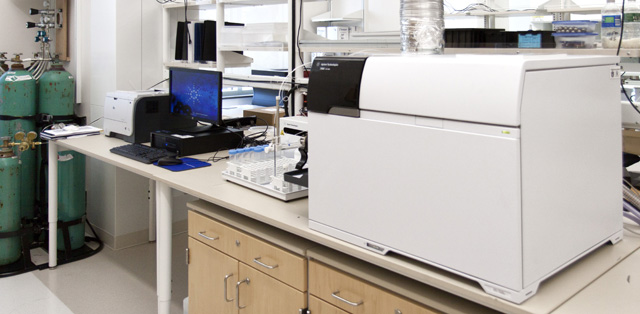ICP-MS
Inductively Coupled Plasma Mass Spectrometer
|
|||||
 |
|||||
|
This new facility, located in the Auburn University Center for Advanced Science, Innovation and Commerce (CASIC), contains a newly acquired Agilent 7900 Quadrupole ICP-MS system for high resolution multi-elemental (from 6Li to 238U) analysis of liquid and solid samples. The system includes a high temperature (>6000°K) plasma source capable of ionizing samples, an interface system to transfer ions into the mass analyzer, and collision/reaction cells (CRCs in He or H2 mode) to remove interferences caused by argon molecules (e.g., 40Ar 35Cl on 75As, 40Ar 37Cl on 77Se). Q-ICP-MS can rapidly measure trace elements at very low detection limits (to ppt levels) as well as major elements (at ppm levels). Elemental analysis can be performed on a PC-based MassHunter software. This facility also contains a Laser Ablation System for spacially resolved analysis of solid samples. The system is a NWR193, a 193nm excimer laser system from Elemental Scientific Lasers. Applications IICP-MS has been also widely used in earth, environmental, engineering, and life fields for quick and accurate multi-elemental analysis and isotope ratio measurements on water, geological (rocks, minerals, sediments, soil) and biological (tissues, plants, bone) samples. Sample Preparation Solid samples must be converted into an aqueous form using microwave or acid digestion methods. Total dissolved solids should not exceed 0.1 wt % (0.1 g per 100 ml of solution). Sample should be filtered with 0.45 micron syringe filter and acidified using 2% trace grade nitric acid. |
|||||
| Lab Location and Contact Information | |||||
|
|||||